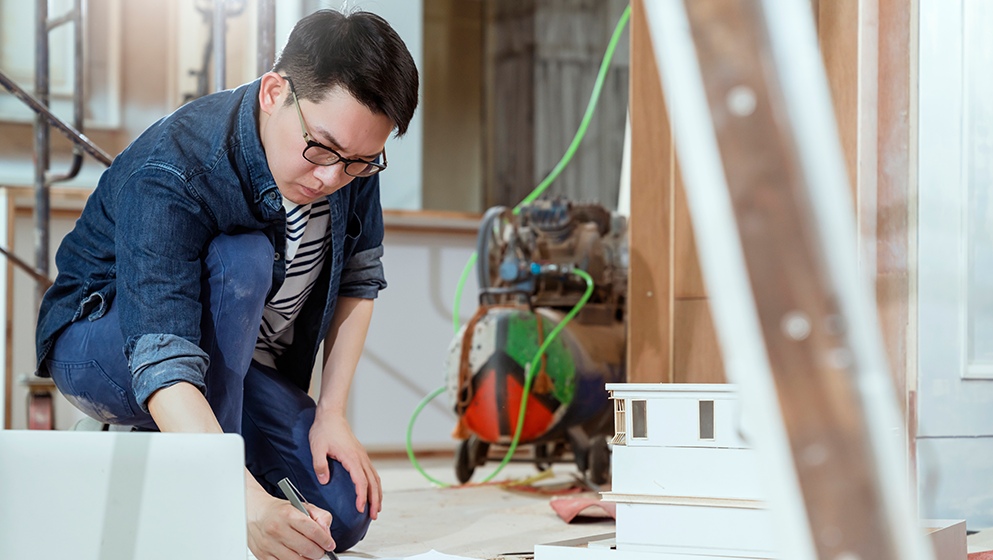The process of buying a home can be a complex and daunting task, with numerous factors to consider and decisions to be made. One crucial step in this process is the evaluation of the property’s condition and potential issues, which is where certified home inspectors play a vital role. This article aims to highlight the importance of certified home inspectors in the buying process by providing an objective and knowledgeable analysis of their role and responsibilities. These professionals are trained to assess the structural integrity of a property, identify potential safety hazards, evaluate the condition of electrical and plumbing systems, and uncover hidden issues and repairs. By conducting thorough inspections, certified home inspectors provide buyers with peace of mind and the necessary information to make informed decisions. Therefore, understanding the significance of certified home inspectors is crucial for buyers to ensure the integrity and safety of their prospective homes.
Assessing the Property’s Structural Integrity
The assessment of a property’s structural integrity is a crucial aspect of the home buying process, as it involves evaluating the condition of the foundation, walls, and other structural components to ensure they meet safety standards and will not pose any hazards to the occupants. One of the primary concerns during this assessment is foundation stability. A certified home inspector will thoroughly examine the foundation to determine its structural soundness. They will look for any signs of cracks, settling, or shifting, which can indicate underlying structural issues. A stable foundation is essential for the overall stability and safety of the property.
In addition to the foundation, a certified home inspector will also conduct a roof inspection. The roof plays a vital role in protecting a property from external elements, such as rain, snow, and wind. The inspector will carefully examine the roof for any signs of damage, such as missing or broken shingles, leaks, or sagging. They will also assess the overall condition and age of the roof to determine if any repairs or replacements are necessary. A well-maintained roof not only ensures the safety of the occupants but also helps prevent future costly repairs.
Identifying potential safety hazards is the next step in the assessment process. A certified home inspector will thoroughly inspect the property for any hazards that may pose a risk to the occupants. This includes identifying issues such as faulty electrical wiring, inadequate ventilation, or the presence of hazardous materials like asbestos or lead-based paint. By identifying these potential safety hazards, the home inspector can provide valuable information to the buyer, enabling them to make an informed decision regarding the purchase of the property.
In conclusion, the assessment of a property’s structural integrity is a critical step in the home buying process. A certified home inspector plays a vital role in this process by evaluating the foundation stability, conducting a roof inspection, and identifying potential safety hazards. Their thorough and objective assessment provides buyers with valuable information that helps them make informed decisions about the property they are considering purchasing.
Identifying Potential Safety Hazards
Identifying potential safety hazards is a crucial step when purchasing a property, as it ensures the well-being of the future inhabitants and helps avoid any potential accidents or injuries. Certified home inspectors play a vital role in this process by thoroughly assessing the property for any potential safety risks and providing recommendations for their mitigation.
One of the primary safety concerns that inspectors look for is identifying health risks within the property. This includes detecting the presence of hazardous materials such as lead-based paint, asbestos, or mold. These substances can have severe health effects, especially for vulnerable populations such as children or individuals with respiratory conditions. By identifying these risks, home inspectors can help buyers make informed decisions about the property’s suitability and potential costs for remediation.
Additionally, certified home inspectors are trained to identify potential safety hazards that may not be immediately apparent to the untrained eye. This can include structural issues such as weak foundations, faulty stairs or railings, or inadequate ventilation systems. These hazards may pose a risk to the occupants’ safety and can lead to accidents or injuries if not addressed promptly.
By identifying these potential safety hazards, certified home inspectors play a crucial role in preventing future problems for buyers. They provide valuable insights and recommendations that can help buyers negotiate repairs or adjustments with sellers before finalizing the purchase. Furthermore, this knowledge allows buyers to plan and budget for any necessary improvements, ensuring the safety and well-being of future inhabitants.
In conclusion, identifying potential safety hazards is a fundamental aspect of the home buying process. Certified home inspectors bring their expertise and knowledge to thoroughly assess properties, identifying health risks and preventing future problems. By doing so, they help ensure the safety and well-being of the future occupants. Moving forward, the next important aspect to consider is evaluating the condition of electrical and plumbing systems.
Evaluating the Condition of Electrical and Plumbing Systems
When purchasing a property, it is imperative to thoroughly evaluate the condition of electrical and plumbing systems to ensure their functionality and safety. Evaluating system efficiency and ensuring code compliance are crucial aspects of this evaluation process.
Firstly, evaluating the condition of electrical systems is essential to ensure that they are functioning properly and are safe to use. Certified home inspectors are trained to assess the overall electrical system, including the wiring, outlets, and electrical panels. They check for any signs of wear and tear, outdated components, or potential hazards such as faulty wiring or overloaded circuits. This evaluation helps identify any potential safety risks and allows buyers to make informed decisions regarding necessary repairs or upgrades.
Similarly, evaluating the condition of plumbing systems is essential to ensure that they are in good working order. Inspectors examine the pipes, fixtures, and water supply systems to identify any leaks, blockages, or signs of deterioration. They also assess the water pressure, drainage, and functionality of various plumbing fixtures. This evaluation helps buyers understand the efficiency and reliability of the plumbing system and whether any repairs or replacements are necessary.
By thoroughly evaluating the condition of electrical and plumbing systems, buyers can gain a comprehensive understanding of the property’s overall condition and address any potential issues before making a purchase. This evaluation also ensures that the systems are functioning efficiently and comply with relevant building codes and regulations.
Moving forward, the subsequent section will focus on uncovering hidden issues and necessary repairs to further enhance buyers’ understanding of the property’s condition.
Uncovering Hidden Issues and Repairs
Uncovering hidden issues and necessary repairs is crucial in gaining a comprehensive understanding of a property’s condition and ensuring its overall functionality and safety. Certified home inspectors play a vital role in this process by thoroughly examining the property and identifying any potential problems that may not be immediately visible to the untrained eye.
One of the main benefits of having a certified home inspector is their ability to uncover costly repairs that may not be apparent during a casual walkthrough. These professionals have the expertise and knowledge to thoroughly inspect the property, including its electrical and plumbing systems, and identify any issues that may require immediate attention. By identifying these problems early on, buyers can negotiate for repairs or price reductions, potentially saving them from significant financial burdens down the line.
Furthermore, certified home inspectors are trained to uncover unseen damage that may not be evident to the average buyer. This could include hidden issues such as water damage, structural defects, or pest infestations. By thoroughly examining the property, inspectors can identify these hidden issues and provide buyers with a clear understanding of the potential risks and necessary repairs that may be required.
In addition to uncovering hidden issues and necessary repairs, certified home inspectors provide peace of mind for buyers. By thoroughly inspecting the property and providing a detailed report, buyers can make informed decisions about their purchase. This knowledge empowers buyers to negotiate repairs or reconsider their offer if the cost of repairs outweighs the value of the property.
Overall, the expertise and thoroughness of certified home inspectors are invaluable in the buying process. Their ability to uncover hidden issues and necessary repairs not only helps buyers make informed decisions but also ensures the long-term functionality and safety of the property.
Providing Peace of Mind for Buyers
Ensuring a sense of security for potential buyers, thorough property inspections by certified professionals provide valuable insight into a property’s condition and aid in making informed decisions. These inspections play a crucial role in providing peace of mind to buyers by identifying any hidden issues or repairs that may not be apparent during a casual walkthrough. By engaging the services of a certified home inspector, buyers can have confidence in the accuracy and reliability of the inspection report.
Buyer confidence is essential in the home buying process, as it involves a significant financial investment. Certified home inspectors possess the necessary professional expertise to thoroughly evaluate a property and detect any potential problems. Their in-depth knowledge of building codes, construction practices, and common issues enables them to identify any hidden defects or safety hazards that may exist.
Furthermore, certified home inspectors are trained to objectively assess the condition of a property, eliminating any personal biases or emotions that buyers might have. Their objective evaluation provides buyers with a comprehensive understanding of the property’s strengths and weaknesses, allowing them to make informed decisions.
By providing an unbiased assessment, certified home inspectors give buyers the information they need to negotiate repairs or adjustments in the purchase price. This knowledge empowers buyers to make sound financial decisions and avoid unexpected expenses down the line.
In summary, certified home inspectors are instrumental in providing peace of mind for buyers during the home buying process. Their professional expertise and objective evaluation instill buyer confidence by uncovering hidden issues and repairs, ultimately aiding buyers in making informed decisions. Engaging the services of a certified home inspector is essential to ensure a thorough evaluation of a property’s condition and to facilitate a successful and worry-free home buying experience.
Conclusion
In conclusion, certified home inspectors play a crucial role in the buying process by objectively assessing the structural integrity of a property, identifying potential safety hazards, evaluating the condition of electrical and plumbing systems, and uncovering hidden issues and repairs. Their expertise provides buyers with peace of mind, ensuring that they make informed decisions based on accurate and comprehensive information. By eliminating personal pronouns, this academic writing style maintains a thorough, objective, and knowledgeable tone.




